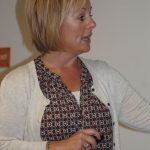
Editor’s note: On Nov. 8, the state’s general election will be held. Voters will choose a state senator for District 32, which includes the Hill. As a result of redistricting after the 2020 Census, there is no incumbent in this race. The two candidates are Democrat Brian Nash and Republican Assemblyman Kelly Seyarto. The Town Crier interviewed each candidate and both stories appear in this edition of the paper.
Brian Nash, the 42-year-old Democratic candidate for the state Senate District 32 seat, lives in Murrieta and is a Michigan native. After high school, he worked and eventually he and his wife, Nancy, headed to New Hampshire. There he graduated from Southern New Hampshire University and earned a master’s in business administration degree from Indiana University before moving to California for work.
“It’s an amazing experience. Living in California is new and a lot of fun,” Nash said beaming.
He has been traveling the district to meet voters, to learn local issues and to seek support. But this is his first race for elective office and he said, “I’m an introvert at heart. This is pulling me out of my comfort zone.”
The first page of his website (https://electbriannash.com/) identifies three issues: mass shootings, Roe v. Wade, and the effect of housing, health care and inflation on families.
In response to the question of why mass shootings is one of the critical issues on his list, Nash said, “The state Senate can help produce policies that govern the state. I want to help write laws governing guns in California. I want to challenge the status quo. This can happen anywhere, like it did in San Bernardino [which occurred in 2015].”
With respect to the U.S. Supreme Court’s “Dobbs” decision, which changed its Roe v. Wade decision, Nash stressed, “I am appalled. It is really unfortunate and not in line with the majority of people …
“I believe is not my place as a politician to tell a woman what to do,” he added.
And he is a firm advocate for a single-payer health insurance system. Since most working individuals have some form of health insurance through their employer, he argues that converting to a single plan would save money.
“Currently, we are paying a middleman and this money could go directly to hospitals or doctors. With 40 million people [California residents], the cost saving would mean no need to skimp on the plan if implemented well,” he contends.
Climate change is another issue for which Nash has strong feelings. He is worried about the future so he supports Gov. Gavin Newsom’s actions to modify climate change.
In particular, he agrees with the recent Air Resources Board decision to phase out the sales of new gasoline vehicles by 2035. But he does disagree with Newsom’s opposition to Proposition 30, which would tax incomes greater than $2 million and use the money to help establish the electric vehicle culture and wildfires. Newsom argues that Prop 30 is simply a subsidy for Lyft to replace its vehicles.
“I’m not sure why he singled out Lyft. Much of the funds, 80%, goes back to shifting society to electrical vehicles,” Nash argued. “This will be a positive benefit on the climate.”
If the state is going to shift to electric vehicles, Nash acknowledges that we’ll need much more electricity. He wants to see solar, wind and, possibly, new and safer nuclear plants become the source of this needed supply.
He agreed with Newsom’s recommendation to keep open the Diablo Canyon nuclear plant in San Luis Obispo County.
He noted that just three to four days after the California Air Resources Board (CARB) issued its regulation to begin reducing gasoline-powered cars in favor of electric, the state had to urge electric car owners to reduce charging because of the potential electric shortage due to the fires and extreme heat.
In a recently released Stanford University study, as the number of electric vehicle owners grows, more charging stations will be needed and it urges charging vehicles during the day, possibly at work.
“Nuclear power is extremely efficient when it works well,” Nash stated. He would favor construction of new and safer plants while phasing out the older ones such as Diablo.
But Nash has said numerous times, education is the top issue of this campaign. To Balletpedia, he explained, “As the child of a teacher and principal, I know how important a good education is for people to be able to get where they want to go in life. I will vehemently advocate for both better funding for educators, and more options for our learners.”
On his website, he stresses that teachers are overworked and underpaid, and open to constant criticism. He also favors alternative school paths, such as trade schools, rather than just a pre-college curriculum.
Nash also advocates changing the state tax system. He believes the system favors the affluent. “Our tax system is not structured in equitable ways. For example, the wealthy have ways to reduce taxes, like hiring an accountant, that lower income folks don’t have,” he argued.
“We need to update the tax structure rather than simplify components. We need to mediate the gap between highest and lowest earners,” said Nash, describing his goal for the tax system. “It’s extremely difficult for anyone making the minimum wage to get ahead.”
As of Sept. 21, Nash has not filed a campaign financial report with the California Secretary of State. “I’ve kept my contributions very low. There’s already too much money in politics.”
While he said he has a few backers, including he and his wife, those contributions have not risen to a level to require an official report.
“I haven’t looked for [contributions] and I’m not tied to any corporation or PAC,” he said adamantly. “I’m trying to do the right thing.”
While keeping his campaign coffers small, Nash’s Republican opponent, Assemblyman Kelly Seyarto, spent $60,000 on the primary and had $178,000 in cash available on Aug. 1. Since then, he has garnered another $46,000, including $9,700 from Cal Fire Local 2881.
While the state Democratic Party has endorsed Nash, it has provided little financial support. In comparison, Democratic candidate for the 47th Assembly District Christy Holstege has received more than $170,000 from the state party since Sept. 6.









